Pope Francis


THIS YEAR, WE celebrated the 10th anniversary of “Laudato Si’,” Pope Francis’ papal encyclical on the climate crisis. It came at a moment of ascendant hope—the Paris climate talks were just weeks away—and it added immeasurably to that hope: The most recognizable person on planet Earth was using his unique voice not just to offer politician-scale bromides about global warming but to issue a remarkable, deep, and unsparing critique of modernity as it had led us to this pass and a deep and loving vision of where we might still go.
A decade on, much has changed, mostly not for the better. Now the most famous person on the planet is doubtless Donald Trump—and he’s famed for being a vile and evil man, implicated in rape and assault in his own life and complicit in it around the country and the world. That he is supported in this ugliness by a rock-solid bloc of evangelicals brings shame to the Christian witness—shame to the name of Christ.
It’s a good time to revisit just a few of Francis’ words (which seem to be echoed by his successor, Leo), if only to remind our-selves that our species and our faith are capable of moral witness and human goodness. So:
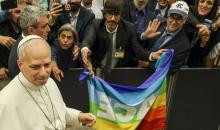
Over a grainy international phone call, I could hear people singing at St. Peter’s Square as I spoke with BBC journalist Mark Lowen about Pope Francis. It was April 21, and I, along with two other queer Catholic advocates, Max Kuzma and Simon Fung, were reflecting on what Francis had meant for each of us and our hopes for the future of the Catholic Church.
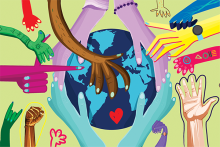
SOME U.S. CHRISTIANS fear that the world is in chaos. These Christians have felt their cultural influence waning as our nation becomes more racially, religiously, and culturally diverse. This “chaos” extends to Sunday worship as once-robust congregations dwindle, tithing decreases, young people leave the church, and denominations split under the pressure of politically motivated culture wars. As someone raised in and deeply formed by the evangelical tradition, I have experienced this panic. It is terrifying.
In response, I’ve seen my Christian peers desperately attempt to control our world by donning red MAGA hats and aligning themselves with political strongmen and bullies. They attain positions of power in an authoritarian regime, place guards at the gates of “doctrinal purity,” and advocate for a Christian nationalism that elevates their rights at the expense of the rights of others.
The question we must ask, though, is if Christians should be in control. Is control the task that God has for us? Is gaining control over others the faithful way to worship God and act neighborly in this chaotic world?
But that does not mean that all control is bad. Wielding power and control becomes disordered when they are treated as ultimate goods. In “On Christian Teaching,” fourth century theologian Augustine of Hippo provides a helpful framework for this: “enjoyment” and “use.” To enjoy something is to treat it as the highest good — as an end in itself. To use something, then, is to put that thing in service to what we ultimately enjoy. God has given us some things to be used for the sake of something beyond them, while others exist to be ultimately enjoyed in themselves. The things that we enjoy, Augustine says, are what we ought to love.
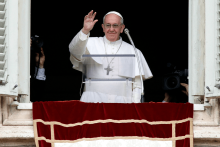
Pope Francis, born Jorge Mario Bergoglio in Buenos Aires, Argentina, was the first in a long line of 266 popes to be from South America and the first born outside of Europe since the 8th century. The pope, also the first to be a member of the Jesuit Order, was beloved by many progressive Catholics and lauded for his priorities of uplifting marginalized communities, protecting immigrants and advocating for environmental justice. According to a 2024 Pew Research Center survey, about 75% of U.S. Catholics viewed Pope Francis favorably.
But he was also a polarizing figure. He struggled to manage the ongoing sexual abuse crisis that plagued his predecessor, Pope Benedict XVI. Pope Francis met with survivors and attempted to pass reforms within the Church, but victims continue to come forward.

The pope’s final months have felt to me like the times when my grandparents were at the end of their lives. We waited for updates from the doctors. We waited with dread for the phone call — or in this case, breaking news emails and social media posts — to bring the final news. There were moments of hope, including Pope Francis emerging from the hospital and appearing in St. Peter’s Square. But we knew that at some point, we’d be facing the loss of someone we loved.
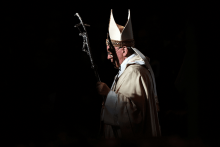
In his 12 years as pontiff, Pope Francis forged a legacy of compassion, humanity, and joy. The pope’s concern for social justice was on the mind of many mourning his death. From climate change to global poverty, war and violence, LGBTQ+ people and women’s roles in the church, Francis was remembered not just for his teachings or leadership on hot-button topics, but also the Argentine’s pastoral approach to the people caught up in them.
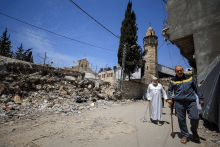
Francis called the church hours after the war in Gaza began in October 2023, Antone said, the start of what the Vatican News Service would describe as a nightly routine throughout the war. He would make sure to speak not only to the priest but to everyone else in the room, Antone said.
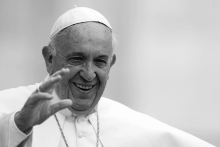
Pope Francis, the first Latin American leader of the Roman Catholic Church, has died, the Vatican said on Monday, ending an often turbulent reign marked by division and tension as he sought to overhaul the hidebound institution.
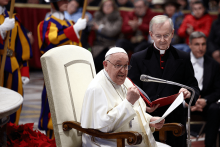
An Israeli government minister criticized Pope Francis on Friday for suggesting the international community should study whether Israel’s military offensive in Gaza constitutes a genocide of the Palestinian people.

In this week’s conversation with writer and novelist Alessandra Harris, we spoke about her love of writing and when she first realized she wanted to be a writer. She was in fourth grade and the story she had written about a genie was chosen by her teacher to receive a prize. When you’re a kid, there’s just something extremely compelling about the fantasy of encountering a genie who will grant you wishes galore. Of course, as a kid, our wishes are rather innocent and self-centered: “I wish I could meet Michael Jordan,” “I wish the Chicago Bulls could win one more championship,” and, last but not least, “I wish for more wishes.” As you grow up, you realize genies aren’t real but that doesn’t prevent you from imagining what you’d wish for if you had three, two, or even a single wish. And as we age, our wishes tend to transform into a single hope for something innocent and unselfish.

“I appeal once again that access to humanitarian aid be ensured to Gaza, and call once more for the prompt release of the hostages seized on last Oct. 7 and for an immediate cease-fire in the Strip,” he said in his Urbi et Orbi address.
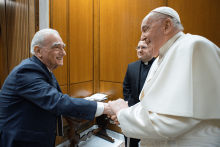
Scorsese, talking about his upcoming film on the life of Jesus, told the Los Angeles Times: “I’m trying to find a new way to make it more accessible and take away the negative onus of what has been associated with organized religion.”
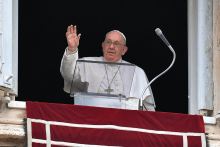
Pope Francis, tackling conflicts in the Middle East and Ukraine in his yearly address to diplomats, said on Monday that “indiscriminately striking” civilians is a war crime because it violates international humanitarian law.
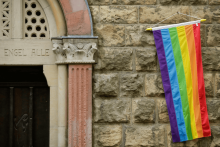
The Vatican on Thursday moved to calm Catholic bishops in some countries who have balked over last month's approval of blessings for same-sex couples, telling them that the measure is not “heretical” or “blasphemous.” In a five-page statement, the Vatican's doctrinal office also acknowledged that such blessings could be “imprudent” in some countries where people who receive them might become targets of violence, or risk prison or even death.
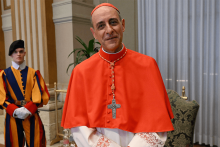
Transgender people can be godparents at Roman Catholic baptisms, witnesses at religious weddings, and receive baptism themselves, the Vatican’s doctrinal office said on Wednesday, responding to questions from a bishop.
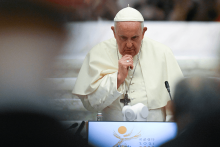
Pope Francis called for an end to attacks and violence in Israel and Gaza on Sunday, saying terrorism and war would not solve any problems, but only bring further suffering and death to innocent people.

Pope Francis on Wednesday appealed to climate change deniers and foot-dragging politicians to have a change of heart, saying they cannot gloss over its human causes or deride scientific facts while the planet “may be nearing the breaking point.”
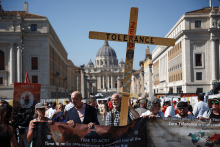
A group of Catholic Church abuse victims and their advocates on Wednesday called on Pope Francis to enforce “zero tolerance” against clerical sex abuse, after completing a six-day pilgrimage to Rome carrying a large wooden cross.
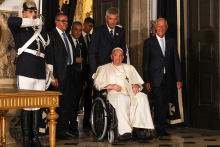
Pope Francis promised on Wednesday to continue to “stir things up” in the church as he arrived in Portugal to preside at a mass gathering of young Catholics aimed at energizing a new generation of believers.
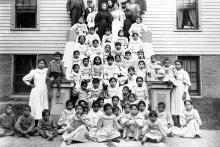
WHEN POPE FRANCIS visited Canada in July 2022, he said he was “deeply sorry” for the abuses inflicted upon peoples from First Nations by more than a century of Catholic-run residential schools. Francis decried the ways “many Christians supported the colonizing mentality of the powers that oppressed the Indigenous peoples,” which resulted in “cultural destruction and forced assimilation.”
To his credit, the pontiff acknowledged that his apology was not “the end of the matter,” and that serious investigation of what was perpetrated and enabled by the church was necessary for the survivors of the schools “to experience healing from the traumas they suffered.”
In the United States, the Seneca Nation is paving a path toward that healing process in their homelands, in particular from harm caused by a Presbyterian-run residential school.
A month after the pope’s apology, Matthew Pagels, then-president of the Seneca Nation — which historically inhabited territory throughout the Finger Lakes and Genesee Valley regions of New York — announced a new initiative to compile and catalog a list of residential school attendees.
To lead the effort, Pagels tapped Sharon Francis, a member of the Wolf Clan of the Seneca Nation and program coordinator at the Seneca Nation crime victims unit. Her passion, she said, is helping her communities heal from personal, intergenerational, and historical traumas.